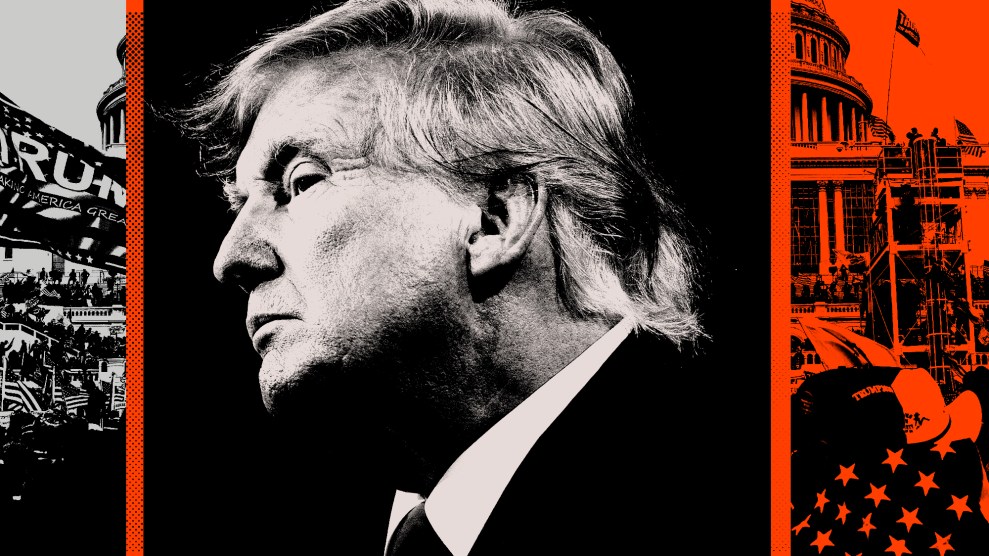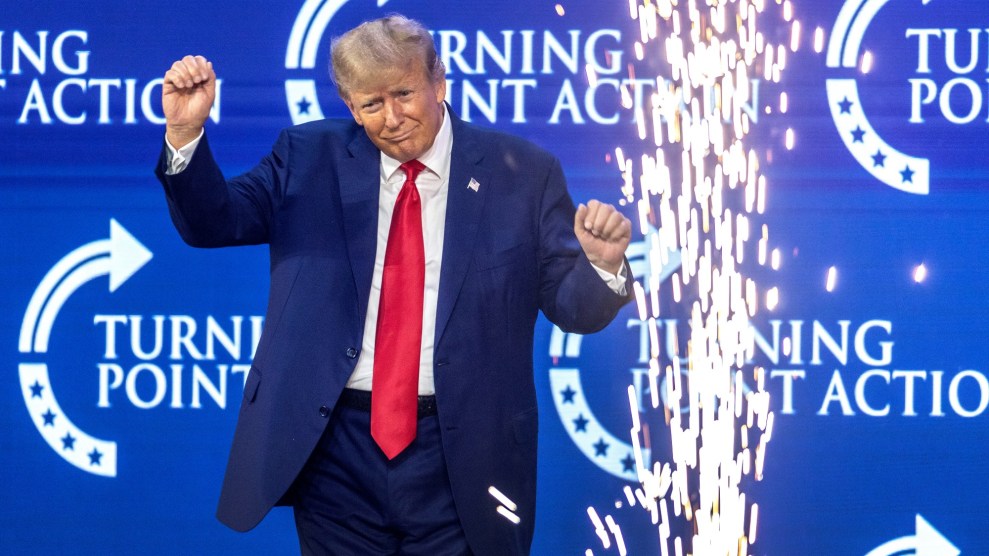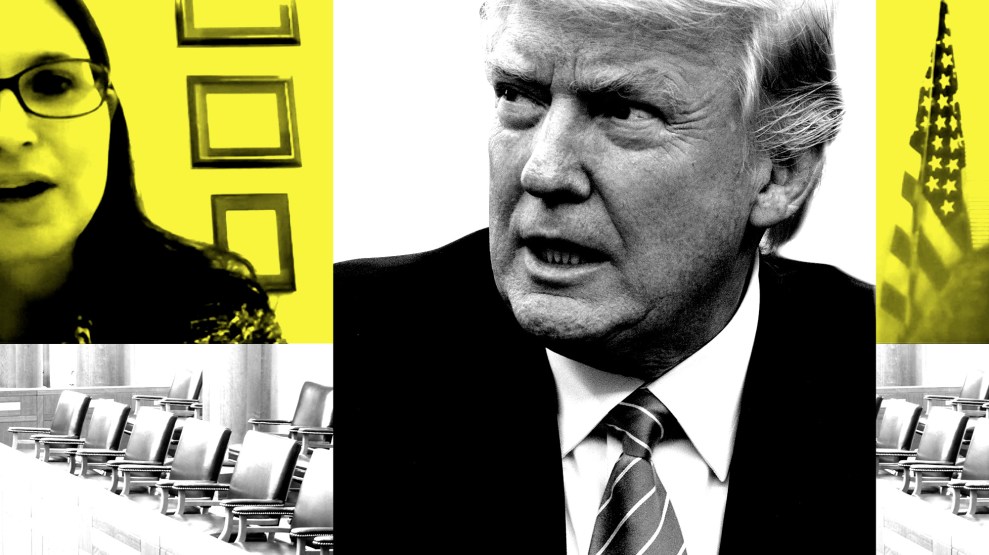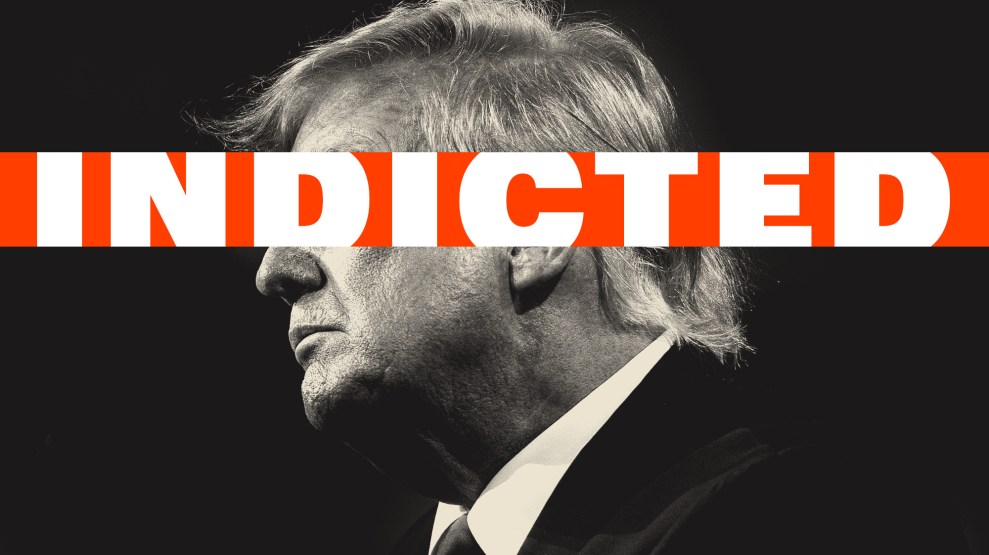
Mother Jones; Alex Brandon/AP, Paul Sancya/AP, Jose Luis Magana/AP
The Justice Department has so far charged more than 1,000 people with crimes related to the January 6 attack on Congress. Now Donald Trump is one of them. On Tuesday evening, a grand jury in Washington brought felony charges against the former president in relation to his effort to subvert the 2020 election.
Four charges resulted from Trump’s efforts to stop Congress from certifying his Electoral College defeat on January 6, 2021. The indictment charges Trump with three conspiracies: defrauding the United States; obstructing an official government proceeding; and depriving people of civil rights provided by federal law or the Constitution.
“Each of these conspiracies—which built on the widespread mistrust the defendant was creating through pervasive and destabilizing lies about election fraud—targeted a bedrock function of the United States federal government: the nation’s process of collecting, counting and certifying the results of the presidential election,” the indictment reads.
The indictment is clear about Trump’s direct responsibility in the scheme to subvert the 2020 election. Of certain lies about the election, prosecutors write: “These claims were false, and the Defendant knew that they were false.” The indictment says Trump’s lies were “integral to his criminal plans to defeat the federal government function, obstruct the certification, and interfere with others’ right to vote and have their votes counted.” During the violence and chaos unleashed on January 6, prosecutors allege Trump “exploited the disruption by redoubling efforts to levy false claims of election fraud.” In the commission of his crimes, the DOJ alleges he embroiled six other yet-to-be-named co-conspirators.
“The attack on our nation’s capital on January 6, 2021, was an unprecedented assault on the seat of American democracy,” Special Counsel Jack Smith told a press conference soon after the indictment was unsealed. Trump was responsible, he said, for a campaign “fueled by lies” in a scheme “targeting a bedrock function of government.” Smith spoke of law enforcement officers at the Capitol on January 6 as “the very best of us” who “put their lives on the line” to defend democracy.
The indictment is the third against Trump in the last four months and the latest in a swirl of legal sanctions the former president faces. He’s battling criminal charges in New York state for falsifying business records and federal charges in Florida over his alleged violations of the Espionage Act and other laws in connection with his refusal to return top secret documents he removed from the White House. In May, a federal civil jury in New York found him liable for sexual assault and defamation. He may soon face additional state criminal charges in Georgia over his schemes to interfere with the counting of votes there. At the same time, he’s fighting a massive civil fraud suit filed by New York’s attorney general.
Today’s federal indictment, though, is probably the most significant. Trump is not the first president to be accused of crimes. But he is the first to mount what has been widely labeled a coup attempt rather than accept defeat. A federal judge in California and the congressional January 6 committee have said that Trump’s efforts were illegal.
But until now, it was not clear if the Justice Department agreed, or at least if Trump would face federal prosecution for attempting to steal the election. In charging Trump in the January 6 case, special counsel Jack Smith is officially arguing that the former president violated criminal statutes, not just democratic norms. Regardless, the case will inevitably function more generally as a defense of American democracy and the peaceful transition of power.
Even before Election Day in 2020, Trump planned to claim, without evidence, that a loss was due to fraud. “That’s our strategy,” Trump adviser Steve Bannon told a group of associates on October 31, 2020, as Mother Jones reported. “He’s gonna declare himself a winner.”
Trump carried out that plan, falsely declaring victory on election night. He and his allies then filed a slew of baseless lawsuits aimed at overturning his defeat in closely contested states. Trump also pressured Republican lawmakers in Michigan, Wisconsin, Pennsylvania, Georgia, Arizona, New Mexico and Nevada to act to stop their states from certifying his defeat.
But with no evidence that voter fraud influenced the election in any state, those efforts failed. States certified their electoral results on Dec. 14. Trump then moved on to a plan to pressure Vice President Mike Pence and Congress not to carry out the previously ceremonial step of certifying the true results. Trump summoned supporters to Washington. His December 19 tweet—with the line, “Be there, will be wild!” —left militant backers believing Trump was encouraging them to act to stop Congress from formalizing Biden’s win.
In a January 6 speech near the White House, Trump falsely claimed he was cheated out of victory, and he encouraged supporters to march toward the Capitol. Though he urged them to “peacefully and patriotically make your voices heard,” he later inflamed them with a tweet charging that Pence “didn’t have the courage to do what should have been done to protect our Country and our Constitution.”
Trump’s effort to pressure Pence included so-called “fake electors” from seven states. These were Trump loyalists who in some cases claimed—and even signed phony documents attesting—that they were the legitimate slates of electors from states that Biden he actually won, though they had no legal basis for their claim. Earlier this month, Michigan’s attorney general charged 16 people with felonies for taking part in the fake elector scheme in that state.
By January 6, Trump allies seemed to hope the fake electors would provide a pretext for Pence to refuse to accept results from those states. Pence lacked power to do that, but it nevertheless could have led to a scenario in which House Republicans attempted to declare Trump the winner.
It was in his last-ditch efforts to stop Congress from certifying Biden’s victory that Trump’s actions broke the law, prosecutors allege.
The charges against Trump have no legal impact on his campaign to return to the White House in 2025. Even if he goes to prison, he could still be elected. Trump’s lawyers, meanwhile, have already pushed to delay his trial in the documents case and are sure to mount similar arguments in the January 6 case. If he wins, Trump is likely to order the Justice Department to drop its cases against him.
All of this means that the 2024 presidential campaign is likely to play out alongside the criminal cases in a completely unprecedented legal and electoral drama.
Trump claims his actions were legal and baselessly alleges that all the charges against him result from an effort by Biden to use the Justice Department as a political tool. There is no evidence that Biden, his team, or Attorney General Merrick Garland—who appointed Smith to avoid the appearance of political interference—have improperly influenced the special counsel’s investigations. But Trump and his fans argue that the varied charges against him in different courts is itself evidence of a conspiracy.
Many Democrats and, reportedly, Garland—or at least some of his advisers—were wary of about the long-term consequences of federal prosecution of a former president. But amid public contemplation of how the charges against Trump test American democracy, it is worth considering the alternative. Not applying laws equally to a former leader, particularly one who attempted a self-coup, would have its own impact on the country.













